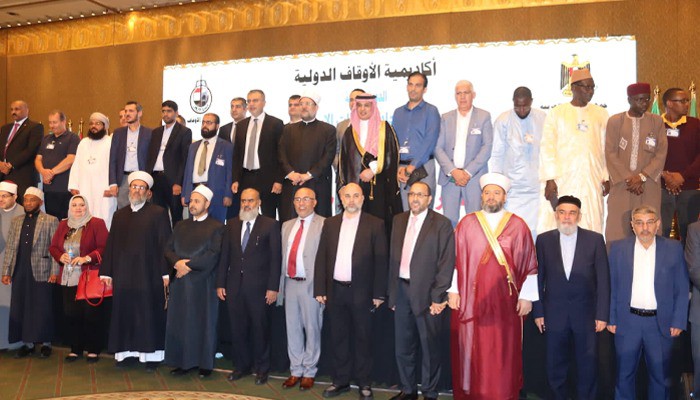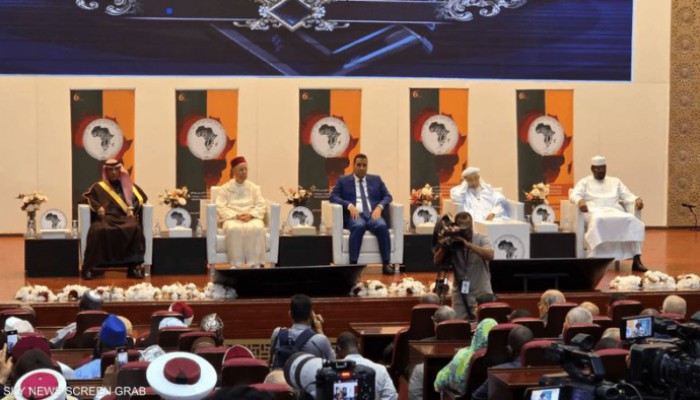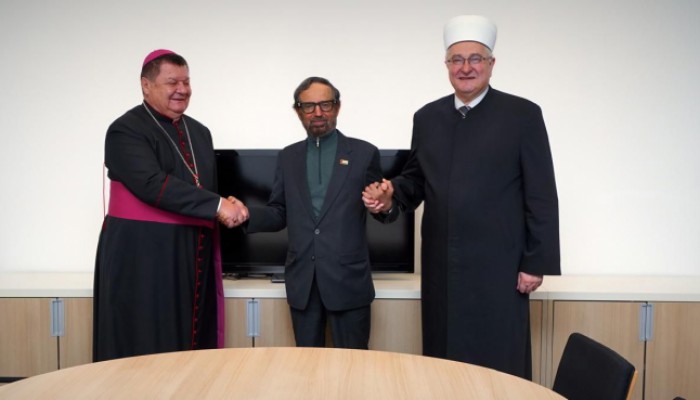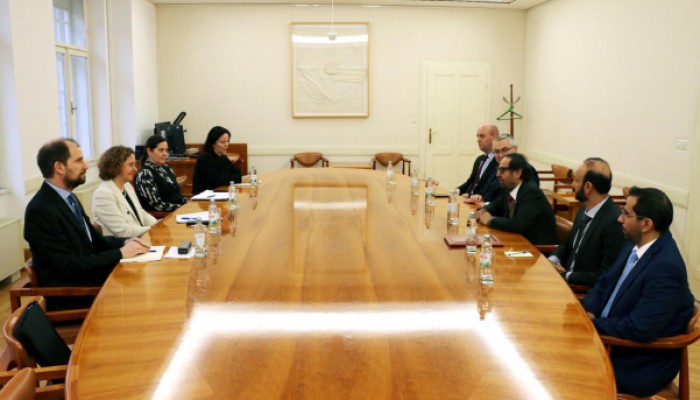
Final communique of the 33rd international conference of the Supreme Council for Islamic Affairs "Ijtihad is the necessity of the era: its forms - its guidelines - its men - the need for it"
- 2022-Sep-27
In the presence of a group of ministers of endowments and Islamic affairs, muftis, scholars, thinkers, intellectuals, parliamentarians, media professionals and writers from different countries of the world, the 33rd international conference of the Supreme Council for Islamic Affairs concluded. It was held in Cairo under the title: “Ijtihad is the necessity of the era: its forms - its guidelines - its men - the need for it” on Saturday and Sunday 28 and 29 of Safar 1444 AH, corresponding to 24 and 25 of September 2022 AD.
The participants unanimously thanked His Excellency President Abdel-Fattah El-Sisi, President of the Arab Republic of Egypt, for his generous sponsorship of this conference, and for the great achievements they witnessed during his reign. They thanked Allah for what was achieved at the hands of President El-Sisi to preserve the security, safety and stability of Egypt, to work tirelessly on its renaissance and progress, and for his support for enlightened moderate thought and spreading the foundations of world peace and coexistence among people.
By extrapolating the conference research, and after two consecutive days of continuous scientific work in eight scientific sessions, the participants ended up issuing the final communique, including two items:
First: The Cairo Document to Promote a Culture of Ijtihad.
Second, some other recommendations.
First: The Cairo Document to Promote a Culture of Ijtihad
It is on Sunday, the 29th of Safar 1444 AH corresponding to the 25th of September 2022 AD, and at the conclusion of the work of the 33rd international conference of the Supreme Council for Islamic Affairs, held in Cairo under the title: “Ijtihad is the necessity of the era: its forms - its guidelines - its men - the need for it.” It was held in Cairo from 28-29 Safar 1444 AH corresponding to 24-25 September 2022 AD, with a wide international presence of ministers of endowments and religious affairs, muftis, scholars, thinkers, intellectuals, parliamentarians, media professionals and writers, from across the globe. The participants unanimously issued the Cairo Document to Promote the Culture of Ijtihad, to be a beacon to be enlightened in this field, and it includes the following:
1. Ijtihad ((juristic judgment on newly-surfacing controversial issues of the religion) is a necessity of the age and every era. its door is open until the Day of Resurrection, but it has its foundations, its controls, and its men who spent their lives seeking Islamic knowledge and understanding its origins and rules and the outcome of matters and their purposes from those who understand the jurisprudence of purposes, outcomes and priorities, and prioritising the interest over the harm. It is essential to balance between an interest and a benefit by choosing the most beneficial of the two, and between a bad thing and the worse by choosing the one that is less harmful than the other.
2. Emphasis on the urgent need to establish and consolidate the rules and controls of ijtihad, especially collective ijtihad in cases where individual statements cannot be relied upon, and in which the fatwa requires multiple and integrated experiences. This is essential in economic, medical, veterinary, climatic issues, agricultural and genetic engineering affairs and other variables of our life and the developments of our time that require the opinion of the experts to issue the fatwa.
3. The diligence that we seek must be controlled by the balance of Sharia and reason together, and it should not be left as plunder to the unqualified, the non-specialist, or the arrogant who want to demolish the constants under the pretext of ijtihad or renewal. The scale is accurate, and the stage is extremely accurate and dangerous; Because of its challenges at home and abroad.
4. That violation of the principles of belief and denying what has settled in the conscience of the nation only serves the forces of extremism and terrorism, especially in light of the circumstances we are going through; Because extremist groups exploit such lapses or omissions to promote rumours of compromising the principles. What we should be aware of and be wary of, if we want to eliminate extremism from its roots, we must also eliminate idleness from its roots, for every action has a reaction that is equal in magnitude and opposite in direction.
5. The conditions of an individual mujtahid must be fulfilled by all members of the accredited collective jurisprudential scientific institutions as complementary.
6. Calling for the criminalization of individual fatwas in issues of public affairs for non-specialists, and working to expand the circle of institutional collective jurisprudence.
7. The need to pay attention to the issue of constants and variables, and to benefit from an analogy in the light of understanding the reasons and purposes of rulings, and the breadth and flexibility of Sharia. Thus, keeping pace with calamities and current, emergency and emerging matters while preserving the constants of the honourable Sharia.
8. Ijtihad in the emerging issues facing Muslims and others in various parts of the world, especially the issues of Muslim minorities, is the duty of the time; To relieve them of embarrassment and hardship, and to contribute to their serious and constructive integration into the societies in which they live.
9. Emphasising that disciplined modern ijtihad and the promotion of its culture among societies, nations and peoples is the basic guarantee for enriching the collective mind with sustainable renewal. It is also essential for protecting the countries and their people from the consequences of stagnation, extremism, and intellectual and behavioural abnormalities. The real ijtihad is the ijtihad that is based on the well-established rules of Sharia, and that the concept of ijtihad in its correct meaning affirms the greatness, flexibility and breadth of Islamic Sharia, and exempts the nation from the fatwas of ignorant, deviant and unqualified people.
10. Staying alert to the danger of stagnation and its repercussions and the dangers of adopting the texts or some fatwas that suited certain circumstances at certain times and dropping them at different times, with the necessity of qualifying the diligent with scientific qualification: interpretation, modernity, jurisprudence, principles and language. This can be achieved through a study of reality and people’s circumstances, to reach the correct understanding and diligence which is consistent with jurisprudence, reality and purposes of Sharia.
11. Scholars of every age should do ijtihad for their time in light of its civilizational developments and new problems. Through thinking and scientific research, and applying the correct understanding of Sharia, with the recommendation to make a modern encyclopaedia of issues of ijtihad, which is what the council’s work team assigned us to do in Supreme Islamic Affairs in Cairo.
12. The importance of collective and institutional effort; Because it is more profound and accurate, as it includes many scientists and specialised experts, and it is a guarantor of the unity of vision in solving many problems.
13. The necessity of preparing a generation of scholars and the formation of sufficient scientific cadres that understand the purposes of Sharia and what is meant by them, and meet the conditions, rulings and controls of ijtihad. Such scholars will be able to deal with events and facts, exercise reason in the major calamities and dilemmas that occur, and search for legitimate solutions to them that are consistent with the jurisprudence of reality.
14. The necessity of dismantling the rhetoric of extremism, working to spread the tolerance and moderation of Islam, and building correct awareness about the concept of citizenship, which is an integral pillar of nation-building.
15. Explaining the importance of impartiality in ijtihad, and that it should not be tainted by partisan, sectarian, ethnic, or tribal inclinations or any other reason that derails it from its correct path.
16. The necessity of spreading awareness among people of the distinction between ijtihad and uttering an opinion, for ijtihad is based on foundations, rules, controls, and conditions. As for uttering an opinion, it has no basis, and its owner may attribute to the Shari’a what is not in it due to his lack of understanding of the text and his lack of depth and knowledge of it.
Second: Some other recommendations
1. The necessity for religious, cultural and educational institutions to publish what the jurisprudence and scientific academies have settled on the danger of dealing with cryptocurrencies in their current system. This aims to prevent people from falling into the trap of deceptive transactions, emphasising that refusing to deal with cryptocurrencies is not due to a lack of keeping pace with modern developments, but due to the ignorance and deceit surrounding it, and its inclusion of random speculation, and the lack of guarantees by states.
2. Emphasising that the issuance of money from the legal authority must be subject to the authority of the guardian to prevent confusion, corruption, speculation, deception and illegal behaviour within the monetary system.
3. Emphasising that environmental pollution is a human problem that requires concerted efforts to solve it through diligence and enlightened scientific research, and to stop every activity that causes environmental pollution.
4. Emphasising that Islamic Sharia has called for the preservation, protection and care of the environment, and the preservation of its resources from depletion, misuse and all that harms it, and it strictly forbids corruption on earth, including corruption of the environment, which is a forbidden transgression.
5. The importance of disseminating research and studies related to the environment and the means of preserving it on a large scale. So that it becomes a common human culture while working to create a collective environmental awareness of the vital role played by green areas in general and afforestation in particular, where preserving green areas and other environmental components is a religious requirement socially and nationally.
6. Calling for international cooperation and cohesion to resist environmental abuse, and promote awareness of its dangers, with concerted international efforts in activating the governing principles and laws that deter the behaviour of those who pollute the environment at all national and international levels.
In this regard, the participants in the conference commend the Arab Republic of Egypt for hosting the 2022 United Nations Climate Change Conference (COP27) that will be held in Sharm El-Sheikh in November of this year.
The participants in the 33rd international conference of the Supreme Council for Islamic Affairs affirmed their full confidence in the ability of the Egyptian state to organise such global conferences, appreciating Egypt's role in serving international and humanitarian issues.







